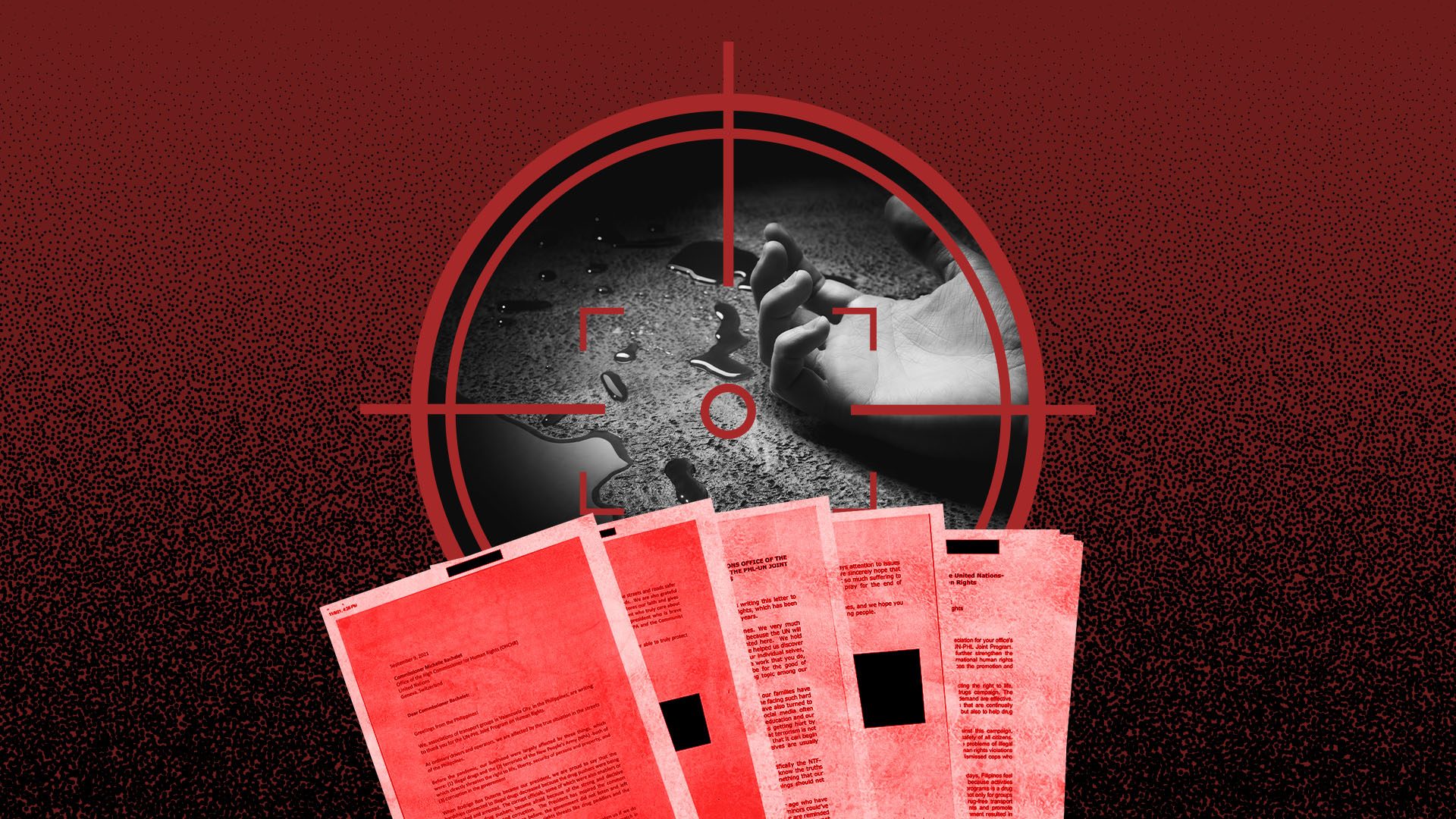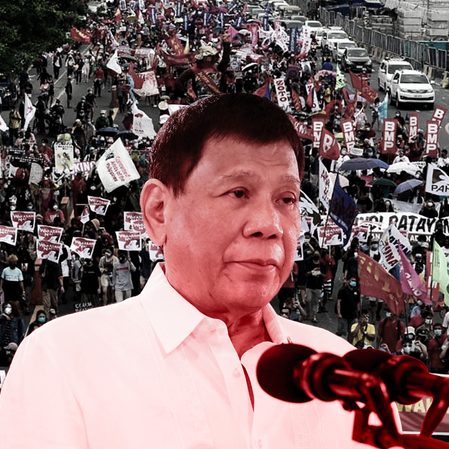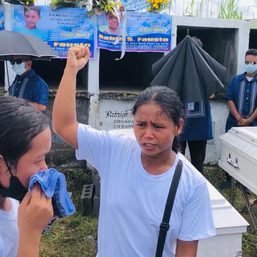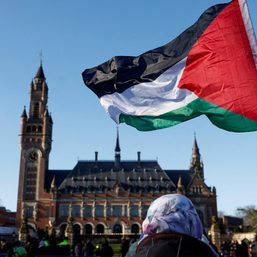SUMMARY
This is AI generated summarization, which may have errors. For context, always refer to the full article.

MANILA, Philippines – The Duterte administration is trying to prove that its human rights program is welcomed and supported by pointing out letters allegedly sent by various Philippine-based groups to the United Nations.
But the letters, reportedly submitted to the office of UN rights chief Michelle Bachelet in October 2021, echo the long-running rhetoric of President Rodrigo Duterte and his allies against human rights groups, including accusing them of being linked to the Communist Party of the Philippines.
Redacted copies were released publicly as part of the Philippine government’s response dated January 14, 2022 to an official communication sent by UN special rapporteurs in 2021, which requested info on the recent cyber attacks against alternative media outfits Bulatlat and Altermidya, and rights group Karapatan.
The government said the enclosed letters is “an indication of the state’s engagement with [civil society organizations] and [human rights defenders] in an enabling civic space.”
One letter cited by the Philippine government “noted that groups that have been monopolizing human rights discourse in the Philippines for some time are being alleged as front organizations.”
It even pointed out that these groups “consistently exhibiting placards directly urging the youth to join the CPP-NPA… while at the same time displaying hate and extremism by imploring everyone to engage in a violent upheaval.”
Another letter hit human rights groups that have “a long history of foreign funding.”

These allegations mirror what the Duterte government has consistently used against civil society organizations. They even went on an official trip in 2019 to ask the European Union to cut its financial assistance to groups they tagged as communist fronts.
Karapatan hit the Philippine government for “brazen red-tagging,” constant vilification of testimonies before the UN, and the opposition to an independent probe into human rights abuses in the country.
In a message to Rappler, Karapatan secretary-general Cristina Palabay said the lines in the letters supposedly sent by non-government organizations “were clearly copy-pasted from government and [National Task Force to End Local Communist Armed Conflict (NTF-ELCAC)] press releases.”
“This is proof that such much-condemned acts continue to be committed with impunity by the Philippine government and are now being leveled against human rights defenders as a form of reprisal on our engagement with the UN Human Rights Council and its mechanisms,” she said.
Philippine Alliance of Human Rights Advocates (PAHRA), a group created in 1986, said the “questionable groups posturing to be nobly driven” do not reflect organic human rights defenders and that they are “mere apologists” for an administration that plunged the Philippines into a crisis.
“Their letters do nothing more than attempt to reaffirm the validity of Duterte’s sham war on drugs and the civic space-shrinking war on terror as well as praise the president to high heavens,” PAHRA secretary general Ellecer Carlos told Rappler.
Criticizing CHR too
Even the Commission on Human Rights (CHR), which has a role in the UN joint human rights program, was not spared in the attacks.
One letter criticized the embattled CHR for having “favoritism and bias towards groups that have a long history of foreign funding, media attention, and trendy websites.”
It added that “human rights has been passed off as an issue of the affluent elites having contacts with CHR and/or donor funding that allows them to connect.”
Another organization, in a letter, accused CHR of “downplaying efforts of families and parents trying to recover children taken by the NPA… while displaying their closeness with front organizations.”

These allegations “appear to miss the core of [the commission’s] mandate,” CHR spokesperson Jacqueline De Guia told Rappler on Wednesday, March 30.
De Guia said that they recognize the diversity of the human rights community in the Philippines and that they have always been open to engage with any group.
“To be an effective [national human rights institution], CHR maintains its openness to the public, including to civil society organizations and all those who seek our assistance in defense of human rights,” she said.
“Our positions are readily available to the public, including our stance against terrorism, employing child soldiers, and the use of violence to pursue any ideology,” De Guia added.
In Defense of Human Rights and Dignity Movement (iDEFEND), meanwhile, said the recent attacks highlight the long-running concerns of civil society regarding the UN joint human rights program, including how it “only serves to delay urgent measures for an independent investigation” into abuses in the country.
“We have concretely shown evidence of the negative impact of Duterte’s authoritarian measures on public trust, public safety and welfare, including during the global health crises,” iDEFEND national coordinator Jhay de Jesus said.
Widespread red-tagging
The recent red-tagging before the UN is part of a hostile environment against activists and human rights organizations calling out the oppressive policies of the Duterte government. Domestic efforts to malign activists, tagging them as combatants, have led to harassment and many times, deaths.
As of December 2021, rights group Karapatan had documented 427 activists and grassroot organizers killed since July 2016. At least 2,807 people were arrested in the same period.
Also looming over the heads of Filipinos is the threat of the anti-terror law, especially after the Supreme Court recently upheld most of its provisions.
UN special rapporteur on human rights defenders Mary Lawlor, who has written to the Duterte government about abuses in the country, called on officials to support the passage of the Human Rights Defenders Protection Act, an important legislation for civil society organizations but has long been delayed in Congress.
“This isn’t the first time I’ve raised concerns about defenders at risk with the government, and I call on them to make good on their commitment to engage with defenders by taking concrete steps to protect those most exposed to attacks and to end impunity for those whose rights have been violated, including those who have been killed in retaliation for their efforts to protect rights,” she told Rappler. – Rappler.com
Add a comment
How does this make you feel?



















There are no comments yet. Add your comment to start the conversation.